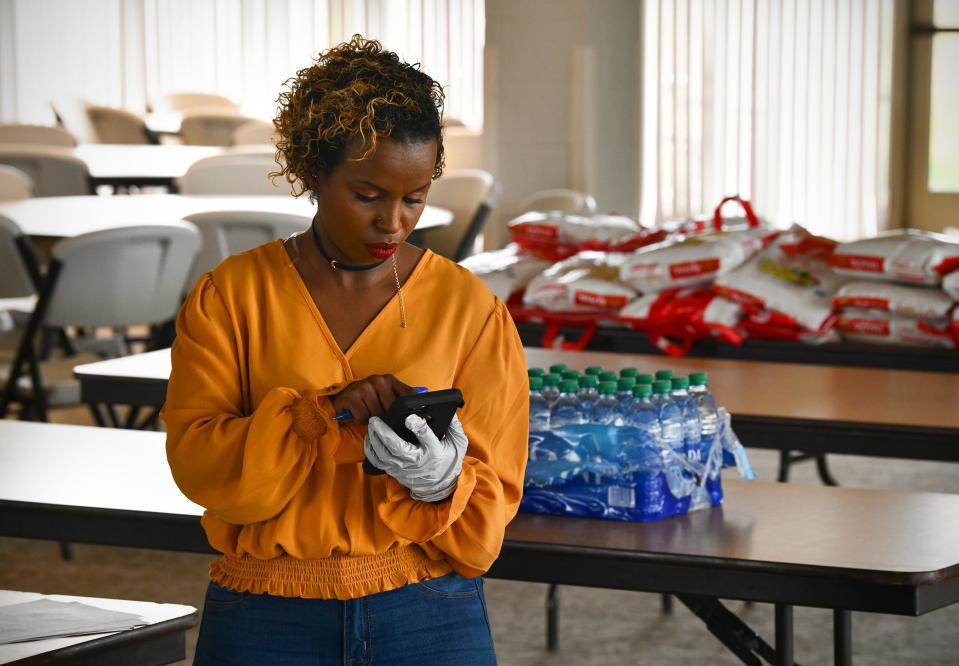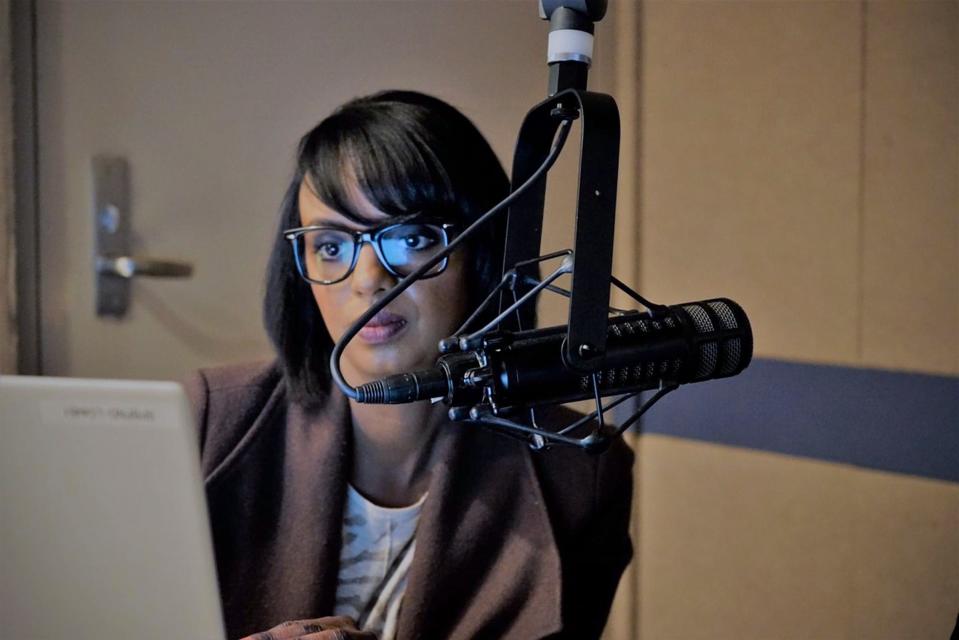Following infant's murder, health professionals educate community on postpartum depression
ST. CLOUD — Still reeling after a St. Cloud woman was accused of murdering her 3-month-old son last weekend, health care professionals in the St. Cloud area are coming together to educate the community on postpartum depression and the importance of seeking mental health care.
Although police have not confirmed whether 26-year-old Fardoussa Omar Abdillahi suffered from postpartum depression, the criminal complaint filed against her indicated Abdillahi lived alone with the child and experienced headaches and feelings of worry and fear following the birth of her son.
Such symptoms are something Mahado Ali remembers all too well.
A former supervisor of cultural competency and health equity for CentraCare, Ali said she got calls about the infant's death from people in the community within minutes of it happening.

Years ago, Ali suffered severe postpartum depression after the birth of her son, and knows first-hand the hopelessness, exhaustion and dark thoughts mothers can go through during their pregnancies and following the birth of their children.
"I know what it's like to be in that dark space and to go through all of that. It just breaks my heart to know that this woman didn't have the support, the help, the services that she should have got, and this had a tragic turn," she said. "Such a sad case for the mom, for the family that's going through that, but also for the community. The stigma of mental health is something that many of us have been fighting against."
More: 'We need more Kahins': Somali refugee helps St. Cloud immigrants recover from trauma, find support
Although stigma surrounding mental health exists in all communities regardless of ethnicity or demographic, Ali said many in the Somali Muslim community are quick to label people in a mental health crisis as "crazy" and in need of spiritual, rather than medical, help.
"So the question becomes, how many lives have to be lost? Whether it's a child that dies or whether it's the mom that goes to jail?" she said. "What needs to happen for people to truly take this issue seriously, and how can we get the community to move past this space of, 'Oh you need to be more connected to God, you need to pray?' And when can we say enough is enough? Let's get this person some help."
What is postpartum depression and what are the symptoms?
It's common for new mothers to experience mood swings, anxiety, crying spells and difficulty sleeping in the following days or weeks after giving birth, due to psychological and chemical changes in the body.
Some mothers experience a more severe form of depression after childbirth that can last several months. Called postpartum depression, it rarely can develop into an extreme mood disorder called postpartum psychosis.
According to the Mayo Clinic, symptoms of postpartum depression may include:
Depressed mood or severe mood swings
Excessive crying
Difficulty bonding with your baby
Overwhelming fatigue or loss of energy
Hopelessness
Feelings of worthlessness, shame, guilt or inadequacy
Thoughts of harming yourself or your baby
Treatment for postpartum depression can include counseling, anti-depressants and hormone therapy.
Kahin Adam, a CentraCare community health worker and psychotherapist, has been working with the Somali and immigrant communities in St. Cloud to reduce the stigma surrounding mental health treatment.

Everyone's postpartum experience is different, he said, and what treatment someone needs depends on their circumstances, support network, ability to navigate the system and access to things like food, a stable income and medical care.
For some, seeking both spiritual and medical help has been effective. Others aren't familiar with Western-style medicine and don't trust it, he said.
That's why mental health resources that are culturally and linguistically appropriate are so important, said Hani Jacobson, a CentraCare community health and wellness nurse.
Jacobson said traditionally when a woman has a baby in Somalia, family and other women in the community care for and support the baby and mother. In the U.S., she said, that doesn't happen as often because family may live far away and everyone's busy.
"That tradition has stopped which has kind of perpetuated the new mom mental health problems we have in the community," she said. "And we have a lot that are really suffering in silence, and by the time they seek help, sometimes it's nearing psychosis or in actual psychosis."
'We missed something'
Ali said there needs to be more comprehensive mental health education in schools, including education on postpartum depression. Healthcare organizations should work closely with moms, especially first-time moms, and staff should be educated on signs of postpartum depression in their patients, especially those who have experienced trauma, she said.
"As professionals, we missed something. As community members, we missed something. And, sadly enough, her family I'm sure that they have missed something where she had to resort to her child dying," Ali said. "I remember having those thoughts and I remember going to my family and crying and not know what was wrong with me."

More: How Somali for Native Speakers class builds confidence and a connection for St. Cloud students
Ali's son was born early, at 25 weeks, and as a young single mother who experienced a traumatic childbirth, Ali said she felt extremely depressed.
"When my child came home after being in the [newborn intensive care unit] for months, I didn't feel any type of attachment to him. I felt like I didn't love him. I couldn't connect with him," she said.
While working two part-time jobs where she made only $9 an hour, Ali said she was constantly stressed and tired, didn't have time for herself, didn't have support from her family and often contemplated suicide so she wouldn't hurt her child.
"It was really rough. And it took me years to truly know that the world didn't hate me and that I wasn't really alone. But I felt so alone all the time," she said through tears. "It really hurts me to see other people go through this and an innocent child die because we just can't seem to move past this cultural or [religious] idea that we have."
More: Where can you learn about COVID vaccines? For some Somali shoppers, at the grocery store.
Ali said once she started taking anti-depressants, her mood improved significantly. She was able to take care of her son, be a better mom, finish school, get her master's degree and see a therapist.
Her insomnia improved as did her eating habits, and she no longer needs to take antidepressants.
Although initially she was skeptical about therapy and medication, over time "it just got to a point where I really looked forward to seeing my therapist," she said. "It really helped to have somebody to talk to. I wish that we would normalize therapy in our community."
Ali said it's important to share her story so others don't feel so alone.
"I feel like I've been able to help other young moms and other women," she said. "In my profession I feel like it was my duty and my call to be able to share my experiences with anybody that can listen, as long as it's going to save somebody's life, whether it's the child's life or whether it's the mom's life."
Where to find help for postpartum depression
On Monday tune in to St. Cloud Somali Community Radio at 1 p.m. to listen to Jacobson and CentraCare gynecology specialist Dr. Fatima Sharifmohamed talk about COVID education and postpartum depression, as well as other resources available in St. Cloud.

To learn more about postpartum depression and treatment options:
Visit your primary care doctor or other health care professional
Make an appointment with the CentraCare Behavioral Health center
Call 320-200-3200 to talk with a CentraCare nurse 24/7
Take advantage of Lutheran Social Service's 24/7 St. Cloud Area Crisis Nursery
Call 911
Becca Most is a cities reporter with the St. Cloud Times. Reach her at 320-241-8213 or bmost@stcloudtimes.com. Follow her on Twitter at @becca_most.
Support local journalism. Subscribe to sctimes.com today.
This article originally appeared on St. Cloud Times: St. Cloud health officials hope to educate on postpartum depression

